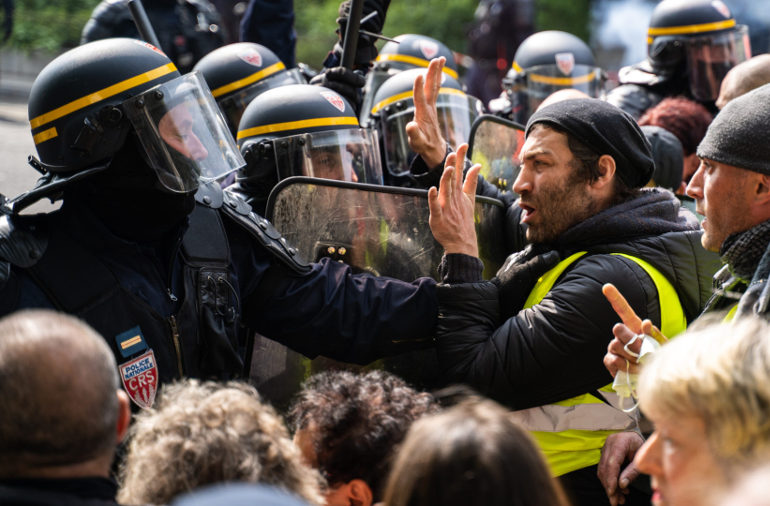The tip of the iceberg is not what sank the Titanic. The US is not an empire in decline just because of Trump’s presidency. Our environment is not collapsing because of one particular megafarm or one particular oil company. The tea tax was not what the American Revolution was about, just as the rise in the cost of bread after a long, harsh winter was not the cornerstone of the impending French Revolution.
Like the top of the iceberg, these are the visible, overt and easy culprits to problems, rather than the deep and manifold causes. We can easily regard them and neatly write them into history books where jagged French peasants hold angry baguettes over their head as they march toward Versailles. The reality, of course, is that they were carrying so much more than just baguettes — they were carrying decades of oppression, rage and resentment.
Fast forward to the 21st century and the echoes of history are apparent. Kings and baguettes may not be the talk of the town, but we still have top-heavy governments fomenting revolutionary ire. Yet, it is just as easy to fall into the same singular and lazy mindset with current events as with historical ones.
THE MOST RECENT ROBBERY
Sticking with France, back in November 2018, French citizens took to the streets in bright yellow vests to protest the neoliberal economic policies of President Macron. Corporate media was quick to jump on the latest hike in fuel tax as the catalyst — some portraying the protesters as angry right-wingers who balked at the idea of green legislation. The reality, however, is that the fuel tax was just the most recent robbery in a long line of austerity stickups.
Since his election in 2017, Macron, the former investment banker, has settled nicely onto his neoliberal throne. For instance, in September 2017, he slashed the “impôt sur la fortune,” a wealth tax aimed at those with a assets of more than €1.3 million (roughly $1.5 million). The hundred wealthiest households in France won an extra half million euros a year.
At the same time, Macron passed reforms to the French Labor Code which cut the power of national collective bargaining and made it easier for companies to hire and fire employees. Macron also slashed housing benefits, raised taxes on senior citizens and came creepily close to channeling Donald Trump when he spoke of building “French greatness” via cuts to unemployment benefits, pensions and the healthcare system.
Even before Macron announced some of his larger “reforms,” in July 2017, the International Monetary Fund (IMF) congratulated Macron on his “ambitious” reforms, saying that he had “rightly emphasized” the need to slash public spending. Throughout these neoliberal cash carnivals, the French people were hardly sitting idly by clutching their yellow vests and waiting for the right moment. They were in fact protesting these cuts and austerity measures long before the Yellow Vests (“Gilets Jaunes”) gained international notoriety.
Most media is late — and lazy. Movements are cumulative. Indeed, if this were all about that single issue, the fuel tax, why did the Gilets Jaunes protests not end back in early December when Macron announced his plan to scrap it? Instead, the Gilets Jaunes protests continued even after Macron announced in late April that he plans to boost pensions and reduce the income tax. So much for those anti-environmentalist single-issue extremists.
“FREEDOM, PEACE, JUSTICE AND THE DOWNFALL OF THE REGIME”
Over the past months in Sudan, young protesters have lead massive street protests that in early April toppled Omar al-Bashir’s 30-year military dictatorship. Media outlets were quick to hone in on the tripling of bread prices as the obvious culprit. But again, that was just the tip of the iceberg.
In November of 2017, the IMF made recommendations for cuts to fuel and food subsidies in Sudan, claiming they were “expensive, ineffective and counterproductive.” Sudan heeded the advice, cutting subsidies which disproportionately affected rural areas. The greedy wisdom of the IMF strikes again.
Fast forward to late 2018 and protests that began in the rural town of Atbara had already spread to 23 towns. While the IMF’s economic distress plan caused widespread oppression, it is not the whole story. The protesters’ demands for “freedom, peace, justice and the downfall of the regime” signal a larger and deeper problem. Indeed, in a co-authored December 2018 op-ed in the Washington Post, Sudanese PhD student Nisrin Elamin notes that “framing the protests as bread riots obscures the larger political context, misrepresents protesters’ demands and inadvertently supports the regime’s insistence that the crisis can be resolved by simply reintroducing targeted subsidies and stabilizing the Sudanese pound.”
Protesters wanted real change — change that would dismantle a regime that, upon seizing power, quickly destroyed trade unions and opposition parties and tortured anyone who stood against or in the way of its violent goals. Violent repression continues even now as earlier this week, four protestors were killed and several more were injured during a sit-in outside the army headquarters in Khartoum, Sudan’s capital. Demonstrators blamed the infamous Rapid Support Forces for the violent attack. This most recent attack comes less than a week after the RSF used live ammunition to disperse a crowd of protesters in Darfur. Darfur, a region in western Sudan, has suffered immensely under al-Bashir’s regime. 300,000 people have died and millions more have been displaced.
Countering the militaristic drive of al-Bashir, the people’s Declaration of Freedom and Change, emphasizes the importance of dealing with tribalism and warring factions diplomatically. Under al-Bashir, 70 percent of the Sudanese budget went to military spending. The declaration also demands funding for health, education and housing. Free speech, an independent judicial system, free and fair elections, and fostering peaceful relations with other nations are other notable points that reflect the nation these Sudanese protesters are fighting for, and thereby reflect the deep and disturbing realities that fueled the protests.
Protesters continue to stand resolutely in the face of military junta threats. They demand freedom, peace and justice — and that requires more than a few price adjustments.
CHARTER SCHOOLS IN THE CROSSHAIRS
Back in January, some 30,000 teachers in LA’s school district went on strike for the first time in 30 years. Following waves of teacher strikes across the nation, LA’s teachers had many similar demands: smaller classroom sizes, school funding and pay raises. Here again, however, it is not just about what you are paying the teacher. It is about the privatization shift in this country that leaves public schools desperately anemic for funding while propping up charter schools.
Hiding behind the facade of “school choice,” charter schools are privately operated and publicly funded vampires that suck funds from public schools by engaging in the same tactic as other privatization efforts: de-fund the public entity then point out how it is failing while you swoop in with your privatized solution.
As with other privatization schemes, charter schools are out to make money and do business. They do not care about the well-being of the kids they serve, and they certainly do not care about the kids left out of their clique. Charter schools cater to the those who have the time, money and privilege to “choose.” As one parent and former teacher put it, “I think ‘school choice movement’ is a misnomer. I view it as a movement based on prejudice, xenophobia and racism.” She is right. Charter schools are at the forefront of the re-segregation shift.
Thanks to their business-first approach, they not only segregate schools and take education opportunities from public school students, they inevitably fail to improve the education of the children they do serve. Charter schools focus on flat and flimsy markers of success such as test scores that do not say anything about a child’s ability to think, or their well-being, but rather their ability to regurgitate information that they are unlikely to retain. For these reasons and more, LA teachers put charter schools in the crosshairs of their ire.
Still, if you looked at media coverage of the LA teacher strike, most focused on the iceberg-tip issues of salary and class size. But without recognizing the impact of charter schools, how can you talk about public school funding? A 2016 report commissioned by United Teachers Los Angeles showed that some $500 million is siphoned from public schools to charter schools every year. That is money that is not going to address class size, teacher wages, reimbursing teachers for money spent on supplies, the hiring of nurses, counselors and other faculty. It is money spent on bolstering a corporate scheme that makes a few people a lot of cash and batters public health (mental, emotional, economic and social).
To talk about why teachers strike without talking about the defunding and delegitimizing of our public school system is like trying to teach English with half the alphabet.
CONNECT, BUILD, SUPPORT
While much of the top-of-the-iceberg problem can be blamed on corporate media’s state-friendly agenda and journalistic laziness, it too goes deeper than that. It is about how we view the world and our struggles within interconnected political systems.
Alternative media does a powerful and important job of digging into the depths, but we can so easily buoy back to the surface. It is tempting and easy to get stuck in tunnel vision. Especially in the age of flash headlines, second-by-second updates and posts that have a shorter lifespan than celebrity romances, we are constantly urged to keep scrolling, to keep consuming more bite-sized information without stopping to find out the contents of what we are eating.
Much like with mindless snacking, there is an instant gratification there. After all, who does not want the easy answer, that quick fix, that simple solution?
Furthermore, in the sometimes disheartening knot of intersectional activism, a neat cause and effect can feel like a much-needed salve, a reprieve from the cross-sections and crosshairs of a system built to out-maneuver dissent. But far from being a cure, this slide into siloed and surface thinking only cuts our power.
Talking about these issues as singular, flat and shallow not only removes context to understanding them, but removes our own experiences from the larger picture. It blinds us to our solidarity, the similarities between our fights to build something better. It places issues in silos that ignore the overarching realities of living in the age of late-stage capitalism and climate change.
It erases the intersections of issues like racism, poverty, sexism, imperialism and more. It paints citizens as extremists, casts our fellow sick and tired as fanatics. After all, it seems like quite an overreaction to demand an entire regime be toppled simply for the price of bread.
Media literacy is key, yes. The importance of reading, sharing and amplifying grassroots media can not be overestimated. However, on that deeper level where we find the ties that connect movements, that build real solidarity and support, we must remember: it is never really about the bread.





